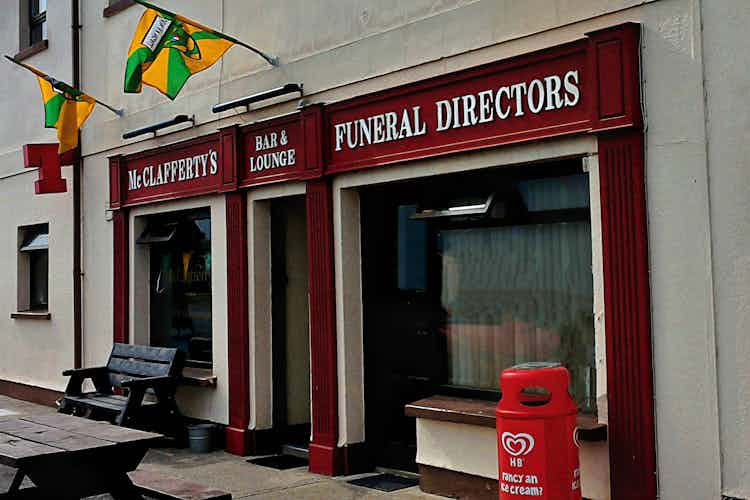You’re not daft enough to hand your money over to anyone promising to deliver the goods after your body’s gone cold. So when buying a funeral plan in the UK, you need to be sure that you can trust your funeral director with a few thousand pounds that you’ll never see again.
The Funeral Planning Authority (FPA) oversaw the industry before the end of July 2022. The Financial Conduct Authority (FCA) now regulates the funeral planning industry. Its 26 authorised providers currently hold approximately 1.6 million plans, covering 87% of the market.
The regulator enforces rules that include:
- A ban on cold calling
- A requirement to deliver a funeral unless the policyholder dies within two years of taking out the plan
- The ability to complain to the Financial Ombudsman Service (FOS)
- Access to the Financial Services Compensation Scheme (FSCS)
The new regulations mean the funeral planning industry is now regulated similarly to many other sectors. It also overtook many of the old responsibilities of the FPA. Let's take a look at how the authority worked in the past.
What was the Funeral Planning Authority?
Established in 2002, the FPA was an industry body for funeral directors and other companies that sell pre-paid funeral plans. It was a voluntary organisation that monitored the administration of policies, ensured proper conduct, and worked to guarantee funeral plans if the provider went bust.
The organisation didn't have any government mandate – that is, no laws gave the FPA power. Instead, the power came from members wanting to be members and offering their customers security with their funeral plans.
For any person or organisation to have become a member, they had to submit a range of documentation and speak with the chief executive. The application process required information such as:
- Application forms
- Detailed information about their business model
- Trust Deeds
- Insurance agreements
- Bank accounts
- Actuarial valuations
- Investment details
- Funeral plan literature
The FPA covered around 95% of all funeral plans sold in the UK. In contrast, the new FCA list authorises 26 providers, making up 87% of the market. You can view the list of service providers regulated by the FCA here.
What did the Funeral Planning Authority do?
The FPA did a few different things, all aimed at helping you as the consumer get a secure and stable plan for your big send-off. The authority's functions were all for consumer confidence and covered a range of issues.
Tracing a plan
The FPA had a tracing scheme that allowed you to enter your or someone else's details and see if a plan existed. They didn't have a database. Instead, they sent the details to all their members to check if what you're looking for sat on their books.
When you filled in their online form, they would do the check and let the funeral plan company contact you. But unfortunately, the system couldn't provide any guaranteed timeframes, and if it found nothing, the FPA didn't notify you.
Protecting your money
Under the code of conduct, all funeral plans regulated by the FPA had to do one of two things with your cash:
- Have the money held in trust. There were rules about who could be trustees, and the details were regularly audited.
- Take out a whole life assurance policy on you to ensure there would be enough money to cover the funeral you'd paid for.
Pledge to customers
The FPA’s Pledge to Customers stated: “All Plan Providers shall co-operate… [In] the event of the insolvency of a Plan Provider, the other Plan Providers will examine ways in which the FPA might assist in arranging delivery of the funeral of the customers of the insolvent Plan Provider.”
It wasn’t a cast-iron guarantee that your funeral plan would have been honoured if the company you bought with went bust. However, it did serve the reputation of funeral companies to help out if something went wrong.
Mediating complaints
Seemingly taking cues from how banking and telecoms regulators work, the FPA gave you recourse if anything went wrong. First, members had to let you know how to make a complaint and accept complaints in any reasonable form. Then, they had a maximum of eight weeks to respond.
The authority also went through conciliation or arbitration if you weren't happy with the outcome of your complaint. The FPA also compelled plan providers to work with organisations, like Citizens Advice, that might be helping you get to the bottom of the problem.
The FCA strengthened this aspect significantly, allowing you to complain to the Financial Ombudsman Service. You'll also have access to the FSCS, meaning your money is protected if the provider falls. It's essential to ensure you choose a service provider from the FCA list to enjoy these benefits.
What was the role of the Funeral Planning Authority?
The FPA was an industry body letting funeral plan providers self-regulate and hold their industry to account. Much of the FPA's processes and language were modelled on official regulators. Still, it wasn't a regulatory body similar to many other industries and had no official Government mandate. Therefore, the move to FCA regulation provides consumers with more protection.
It's worth noting that you can complain to the FOS, even if your complaint happened before July 2022, if the firm was registered with the FPA at the time. Many firms who worked under the FPA applied for FCA authorisation and were required to refund customers or transfer the plans to authorised service providers if they weren't authorised.
If your funeral plan was under the FPA, it's a good idea to check if it is now FCA-regulated. If you're looking for a funeral plan, ensure you pick one from an authorised provider.








